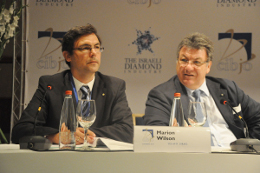A committee of CIBJO representatives from the United Kingdom, Germany, Italy and France met for the first time at the CIBJO Congress in Tel Aviv, aiming to take the lead in discussions to be that are scheduled to held between the jewellery industry and the European Union. The committee was created by the CIBJO Board of Directors at the start of he congress, and it is chaired by Thilo Brueckner of Germany.
One of the main issues being formulated by the EU is legislation along the lines of the U.S. Dodd-Frank Act which deals largely with financial regulation in the United States but also sourcing of gold and preventing the purchase of the metal where there is a concern that it is fuelling rebel forces, such as in the Democratic Republic of Congo.
CIBJO President Gaetano Cavalieri explained the possible legislative moves were multi-faceted, meaning that CIBJO should have a unified voice at the talks.
The EU has distributed a survey on conflict minerals and requested input from CIBJO. Commission members warned that CIBJO should move quickly on the issue of the origin of conflict minerals in order to ensure it ha a voice in the discussion.
Dr. Cavalieri said that due to the large-scale importance of all the issues, CIBJO will send a proposed agenda of issues to discussed to members and requested that they make additions on issues that they wished to see raised. He emphasised the importance of creating strong contact with the EU, since organisations that are not proactive in having an input are simply not heard.
Well-known jewellery designer and manufacturer Roberto Coin addressed the commission, saying he was speaking as a member of the Italian jewellery industry which he said had dropped in size by about 50 percent in recent years. He called for the same regulations to apply to jewellery manufacturers everywhere, in order to create a level playing field. This applied to the amount of nickel in jewellery which CIBJO’s Precious Metals Commission debated at length at its meeting, but also the issue of conflict diamonds, and the sourcing of gold.
“Customs officials should control all products coming into a European country or the United States to ensure that imports do not have an unfair advantage over locally made goods. We produce jewellery according to strict regulations, but we find that imports are not subject to the same rules. That gives them an unfair advantage,” Mr. Coin said.
Photo Caption: From left, EU Committee Chairman Thilo Brueckner and CIBJO President Gaetano Cavalieri.

